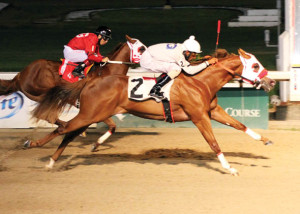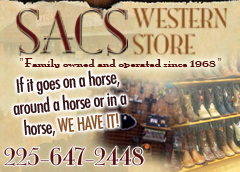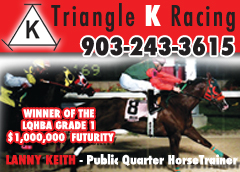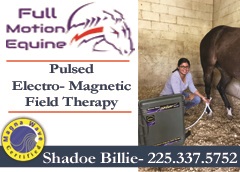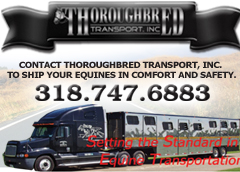Written by Barbara Newtown
Original Publish Date June 2015
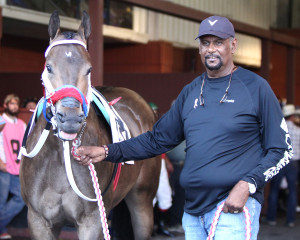 I talked with Kenny Roberts at Delta Downs in Vinton, Louisiana. His success in training racing Quarter Horses has made him a national leader in the industry.
I talked with Kenny Roberts at Delta Downs in Vinton, Louisiana. His success in training racing Quarter Horses has made him a national leader in the industry.
Mr. Roberts, I saw my first Quarter Horse races this week. Those horses take off like rockets! Tell me about gate training.
Anywhere from 85% to 90% of our races are won from the gate. If you get a good start and you’ve got a real good horse, then you are in good shape. Going the short distances that we go, it’s hard to overcome a bad start. I do a lot of gate training. I want my horse really focusing when he’s in the gate. I want him looking down the racetrack. It’s hard, because they’re making a lot of noise when they’re loading horses into the gate. I don’t want my horse worrying about the gate closing. People say, “Everything depends on them leaving.” That’s true.
I noticed that the announcer tells the public if certain horses in a race are wearing a “flipping rig” or “flipping halter.” I understand that it keeps the horse looking forward down the track while he’s in the gate, and that as soon as the gate opens the horse is free. But if the horse pulls back on the rig, it actually can hold the gate shut for a moment.
A lot of horses probably won’t need flipping rigs, but I use them because I want to try to do anything possible to get my horse out of the gate the best way I can. So I help myself and my owners and my horses and my riders by using the rigs. Probably 90% of my horses use them, not just the few that are a little impatient or aggressive.
A flipping rig can go good for you and it can go bad. If a horse sits back on the rope and puts tension on it, yes, sometimes it keeps the gate from coming open. We try our best to stand our horses as much as possible. We groom a lot of horses in the stall. They get used to being tied. When they feel a little tension, they come right back. That’s an advantage I see for trying to win a race.
Have you worked with horses that just won’t stand tied?
If I bring 20 horses out to the gate, I might get one or two that I see don’t like it and will fight it. Then the ones that you think will fight it…won’t. It’s amazing. Most of the time they will get in the gate, pull on the rig a little bit, and they’re done with it and won’t fight it.
We try to do each horse as an individual. They aren’t all the same. I try to train a horse to his personality.
Do the people working the gates have a lot of impact on the race?
Exactly. You don’t know who you’ll get working the gate on the day of the race. To me, when you work the gate, you have got to be a horseman. Trainers and owners and jockeys put their hard work into it…really, you have the jockey’s livelihood in that gate, not just the money, but safety, too. Jockeys can get hurt. That’s why I do everything I can to work with my horses at the gate. I know that things can happen because I’ve had them happen to me before. Your horse might stand a little awkward and fall out of the gate. It happens.
Do trainers make a habit of getting to know the starter and the gate crew?
Oh, yeah, but race night you don’t know who you’re going to get to head your horse, because not everybody that works at night works in the morning. Some of the guys may know your horses, but some won’t. A gate guy has got to have that feel for every horse he handles. Some horses, if you handle them rough, they’ll watch you. And some of the ones you handle rough will show you that they are rougher than you and they will fight. Some of these guys don’t know [the difference]. I try to tell my rider, ‘Hey, just get in the gate and tell whoever is handling your horse to just be easy and don’t fight him,’ but sometimes those headers can be a little smart-alecky and just want to do their job. Things happen.
I wish some of these guys on the gate could focus and understand that you have a life on these horses, and that you have to protect the rider and protect yourself. You have to listen to the jockey. If he tells you to be easy, then be easy. He has been on this horse and he knows. Through this whole racetrack industry, if you’re a jockey, they have to watch you ride to get a license and be approved. If you’re a trainer, you have to take a test to be approved. But if you work the gate, you don’t have to be approved. It’s not right.
Who hires the gate people?
The starter and the racetrack. They try to get the best people, but, to me, they need to go through a system to get the job. You have people all over the world gambling on these horses and it’s in the gate crew’s hands. It’s not in the trainers’ hands anymore. So that’s the only thing I see that is bad on the part of racetracks. I feel they need to get the best and pay them good money. If you pay them well you are going to get good horsemen. I feel that the racetracks need to look at it in that perspective, to try to help the owners, jockeys, and trainers by trying to get the best people they can.
How does a jockey demonstrate that he’s ready for a license?
He shows the starter that he knows how to break from the gate. He has to show that he has learned how to keep a horse straight and in control. He has to know how to whip and switch sticks and things like that.
How in the world do you control a horse if your legs are bent way up in the jockey position?
You have to have balance and good hands and a good mind. If you have those things, you will go a long ways.
Quarter Horse jockeys have to think fast and smart. In a second everything could happen. When they say GO! you have to be focused.
In a Quarter Horse race, does gate position matter?
It all depends on the condition of the race track. If the track is even all the way across, then I don’t care. If the sand is loose, the horses have to work harder. If it’s tight, the horses are going to perform better and run faster. Sometimes the inside might be slow, sometimes the middle or outside might be slow. I like the track at Louisiana Downs a lot. It’s a bad time of year [for the Quarter Horse meet] and it’s real cold, but the track is very, very kind to my horses.
What do you look for in a horse?
If I look at a horse and he’s pretty balanced and moves good, he can really catch my attention. I can’t tell you why I might want a horse. If I go to a sale and see a horse that really grabs me and makes me look at him, most of the time I have people that are going to get him. I can’t tell you why I want him. I just get the feeling that he will work. I tell anybody that when you leave a sale you have to love what you bought and you have to think that you are going to do good.
Are there any body or leg conformation faults that you can live with?
I’ve had all kinds of horses come to me. I’ve had horses sit back in their knees that ran, horses pigeon toed that ran. Now, I wouldn’t go buy that for anyone, but I’ve had people bring them to me and the horses did good. I had a 2-year-old this year that I liked a lot. She was a little pigeon toed and never had a problem until the last set of trials, when she had a little chip in her ankle. I didn’t think she would get that far down the program, but she did. You never know. It depends on the heart they have. Mother Nature takes care of some of them.
Do you x-ray knees?
We x-ray knees, ankles, shins, stifles, hocks, or whatever, if we are going to spend money on a horse. We want to know everything that we can. I’m looking for OCD, or chips, or something like that. I also want to make sure they can breathe real well.
It all depends on how much money I’m going to spend on a horse. If it’s a horse I really like and he does have a little problem that won’t cost me an arm and a leg to fix, I’ll let that owner know that the horse has this or that and I will ask what they want to do, and I’ll suggest that that we get it cleaned up.
When do you start your horses?
If we’re going to run a horse early, like in the Mardi Gras Futurity, I might send him off to get broke in August, when he’s about 18 months old. I want him to be really knowledgeable. No speed work. Just breaking and driving to get him going. He might stay until October.
I send them to a good friend of mine in Texas, also named Kenny Roberts. No kin. I trust him a lot and I believe what he tells me about the horses he breaks for me. He has a real good program and he does super well. He helps my program, because when I get a horse from Kenny I know what category the horse is in. Kenny may say a horse is a little aggressive and I need to wait, or he may think a horse is real nice or looks like he may be something later on. I think a lot of him. He is a good guy and a real, true horseman.
Are there bloodlines that you look for?
Yeah. Horses from the state of Louisiana. We have good horses here. The stallions are good. People that buy horses here can go anywhere and compete. I went to California and won big races with horses that came from right here. I won All American Derby races with horses from right here in the state of Louisiana. I feel we have one of the best breeders programs in the nation.
Anything you want to add?
I hope some of the things I say get to the right people and things get done. I want to make racing better for everybody. I’ll tell you, I love this. I wake up in the morning loving it and I go to bed loving it. Racing has its good and bad, but as long as I’ve been in it, it’s been more good than bad!

